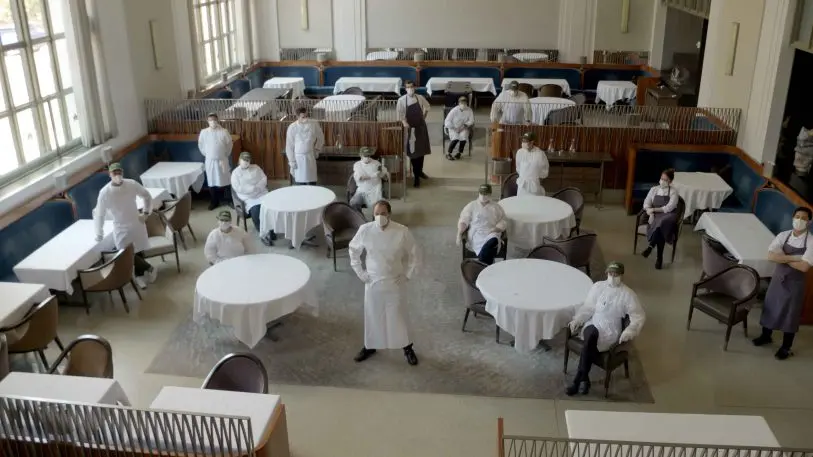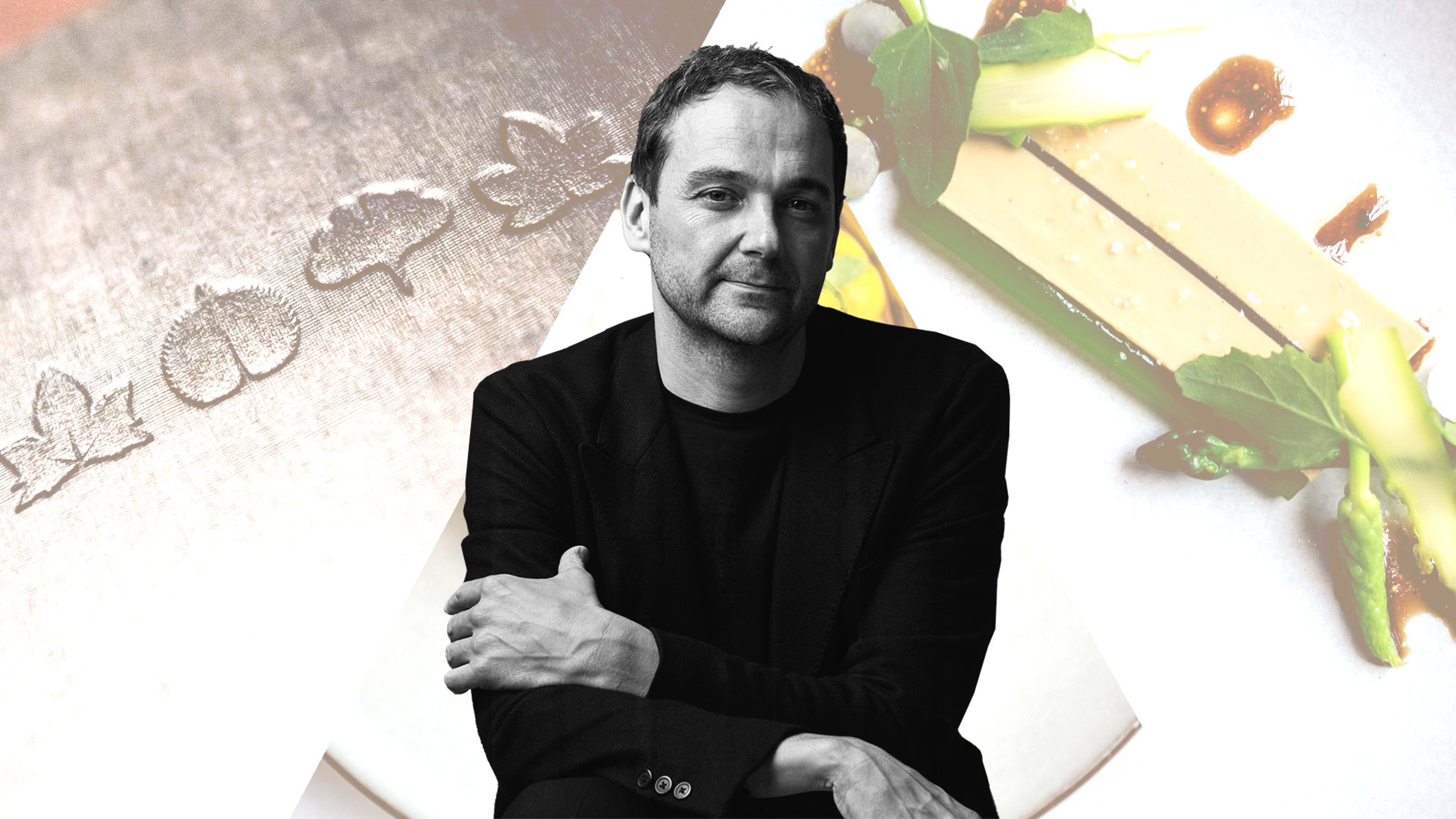For Fast Company’s Restaurant Diaries, we’re asking chefs, restaurateurs, and food-world employees to take readers inside their businesses and lives at this critical moment for the industry.
Chef Daniel Humm’s Eleven Madison Park has been impressing high-profile diners and restaurant critics alike since it opened in 2006. It has three Michelin stars and was voted the World’s Best Restaurant in 2017. But three weeks ago, as coronavirus spread through New York City, Humm was forced to cancel reservations, lay off his staff, and close the restaurant’s doors. Now, he has reopened them to serve a different clientele: doctors, nurses, and other workers on the front line of the COVID-19 crisis. Partnering with nonprofit Rethink Food, Humm and a small staff of employees and volunteers produce and deliver nearly 3,000 meals a day throughout the city. He told us how he made the transformation from fine dining to community kitchen.
Looking back it feels like it happened overnight. Our restaurant was open until Sunday [March 15], before everything shut down. The week before, a private event in Europe where I was supposed to cook had been canceled, so there was definitely an awareness. But even on the night before we closed, we had a full restaurant.
Our industry now hangs on a thread. At Eleven Madison Park, diners pay for a reservation, which is a great business model when everything is going well because you’ve got all the money a month out. But that meant that the first week we closed, we started getting calls from people asking for their money back, and we lost millions of dollars. That’s when I started to realize it was really, really bad.
At first I thought we could keep the core team and rehire the rest [of the staff] later. But looking at the numbers, I realized there was no way we could keep this payroll going when we had no money coming in. We ended up furloughing a few people—and then about 10 days in, we made the decision to let everyone go.
I hope we can open our doors again, but the world is changing very quickly. I don’t know if it will ever be the same.”
People reacted in different ways. Some totally understood the situation. Others thought maybe we could have continued as a delivery service and they would still have jobs. I was concerned about whether delivery would be safe for the staff. If someone got sick, we would have had to shut the whole thing down. Some of our strongest leaders on the team were concerned about coming to work and putting their families at risk. At the end of the day, I hope that people know we’re doing everything we can.
We started a fund for our employees where we auctioned off future dinners and reservations to several [other restaurants] we have access to. We raised about a quarter of a million dollars: It’s helpful, but a drop in the bucket. [Eleven Madison Park had 175 employees.] The government needs to help the millions of workers who have lost their jobs. It’s heartbreaking because we have a lot of foreign workers in our restaurant who are here on work visas, so they aren’t even getting unemployment.
I hope we can open our doors again, but the world is changing very quickly. I don’t know if it will ever be the same. I don’t know what fine dining means. I don’t know what luxury means. Our restaurants rely on a lot of travelers coming from around the world, but are we going to be traveling in six months?
Living through this will help me understand what the new world—when we come out of this—will look like.”
At the same time, as a creative person, I’d like to think there’s a silver lining to it, or that there is some beauty in the situation. It’s too early to tell, but that’s what I want to believe. There’s no other place I want to be than New York. The city has given me so much. And I feel like living through this will help me understand what the new world—when we come out of this—will look like. It’s a horrible time, people are dying, but I’d like to think that we can learn from it.

[The restaurant business] is such a wonderful industry because we are in the business of hospitality, of giving. So I started thinking, after we closed, How can we give during the time? I found some quiet time, I went on a few longer bike rides, and I asked myself, What are my opportunities here? I thought: I have a kitchen that is insanely clean. I have connections to suppliers. I can prepare meals. One of our alumni started Rethink Food, and I’m on the board, so I called him and asked, “What if I raised money and we made meals, and you guys deliver them?” Within seven days, with some help from American Express, we had a system in place, and we turned Eleven Madison into a community kitchen.
I’m struggling with whether it is the right decision. I had a lot of people who’ve said, “Are you crazy? What are you doing? We can’t be outside right now. People are dying.”
I don’t know what the right thing to do is. No one does. Before we set the community kitchen up, I was [on my way] to visit a soup kitchen at the Naval Yard to see how they were doing it, and I learned of the passing of my friend, chef Floyd Cardoz [of Paowalla and Tabla]. I was in shock. But then I got to the soup kitchen and it felt good to see people working.
In our kitchen, safety is our number-one priority. We have 20 people [volunteers and former employees rehired at minimum wage] working in small groups. There is only one entrance to the restaurant. Everyone who comes in has to wash their hands and put on gloves. We also take their temperature. If it’s too high, they are not allowed to work.
We also want to help out some farmers and suppliers through this. Usually a meal consists of a vegetable, a starch, and a protein—and the portions are very generous. We’re making almost 3,000 meals a day. And they’re delicious: Today we made a great chicken leg with couscous and carrots. The meals go out to hospitals, nursing homes, and police stations.
It’s a small thing I can contribute. I hope others will do the same if they can, so that more meals are available. At the same time, I understand people who don’t think we should be moving around right now. There is no judgment. I’m just doing what I think is right.
More from Fast Company’s Restaurant Diaries:
- Alinea’s Nick Kokonas isn’t waiting on Congress to save his restaurants.
- Chef Kwame Onwuachi of Washington, D.C.’s Kith/Kin on his decision to close his restaurant and lay off his employees.
- ‘I’m at risk’: What it’s like to work at McDonald’s during the pandemic.
- How Panda Express is fighting COVID-19 racism.
- Chef Thomas Keller is suing his insurer to save American restaurants.
Recognize your brand’s excellence by applying to this year’s Brands That Matter Awards before the early-rate deadline, May 3.
